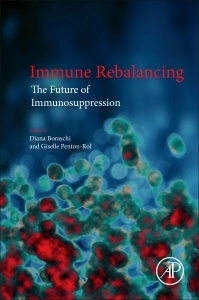Description
Immune Rebalancing
The Future of Immunosuppression
Coordinators: Boraschi Diana, Penton-Rol Giselle
Language: English
Subject for Immune Rebalancing:
Keywords
Allergy; Anakinra; Antibiotics; Antibody; Autoimmune diseases; Biological drugs; Biologics; C-phycocyanin; Cancer; Cancer vaccines; Chronicity; Clinical trial; Computational biology; Cytokines; Diet; Eosinophils; Fecal microbiota transplantation; Gastrointestinal tract; Genomic; Germ-free mice; IgE; Immune activators; Immune mechanism; Immunomodulation; Immunosuppressants; Immunosuppression; Immunotherapies; Immunotherapy; Inflammation; Inflammatory bowel diseases; Interleukin-1; Interleukin-1 receptor antagonist; Macrophages; Mast cells; Metabolites; Microbiota; Multiple sclerosis; Nanoparticles; Nanopharmaceuticals; Natural products; Network biology; Neurodegenerative diseases; Neuromyelitis optica; Novel approaches; Phycocyanobilin; Polarization; Prebiotics; Precision medicine; Prevention; Probiotics; Proteomic; Regulatory T cell activation; Resolution of inflammation; Rheumatoid arthritis; System medicine; Systems biology; Th2 cytokines; Theranostics; Therapy; Transcriptomic; Treatments; Vaccines
Support: Print on demand
Description
/li>Contents
/li>Biography
/li>Comment
/li>
Immune Rebalancing: The Future of Immunosuppression summarizes the most promising perspectives of immunopharmacology, in particular in the area of immunosuppression by considering molecular pathways, personalized medicine, microbiome and nanomedicine.
Modulation of immune responses for therapeutic purposes is a particularly relevant area, given the central role of anomalous immunity in diseases. These diseases vary from the most typically immune-related syndromes (autoimmune diseases, allergy and asthma, immunodeficiencies) to those in which altered immunity and inflammation define the pathological outcomes (chronic infections, tumours, chronic inflammatory and degenerative diseases, metabolic disorders, etc.
2: Mechanisms of immune-related pathologies and their current treatment
2.1 Rheumatoid arthritis
2.2 IBD and Crohn’s disease
2.3 MS and neurodegenerative diseases
2.4 Allergic diseases
2.5 Cancer
3: Biologics as immunosuppressive agents
3.1 Modulating macrophage activity
3.2 Modulatig inflammatory cytokines: IL-1
4. Systems medicine and personalised medicine
5. Modulation of the microbiome for immune re-balancing
6. Natural products
7. Nanomedicine
Diana Boraschi is an immunologist that built her experience both in academic institutions (Italian National Council for Nuclear Energy, Italian National Research Council, National Cancer Institute in Bethesda, MD, Mario Negri Institute in Milan, Italy, University of Michigan Medical School, Ann Arbor, MI) and industrial settings (the vaccine company Sclavo in Siena, Italy; the pharmaceutical company Dompé in L’Aquila, Italy). She is presently Research Director at the Institute of Protein Biochemistry of the Italian National Research Council in Naples. She has served as Director of Fellowships at the Human Frontier Science Program Organization in Strasbourg, France, and as external expert evaluator for the research programmes (FP5, FP6, FP7, H2020, EDCTP) of the EU Commission, the Singapore National Medical Council, and the US National Science Foundation. She is author of 156 peer-reviewed research articles in immunology, editor/author of 17 books, and inventor in eight patents, in addition to numerous monographic and divulging publications. She is particularly involved in higher education training activities and capacity building actions in Africa, in the field of poverty-related diseases and health care systems and delivery.
Diana Boraschi studies the mechanisms of innate defence responses, focussing in particular on the role of macrophages and inflammatory cytokines in the effector phase of defence reactions against infections and tumours. Her main interests are the receptors of the IL-1R/TLR family and their cytokine ligands (IL-1 and IL-18). A fragment of IL-1 endowed with immunostimulatory activity is now defined as the “Boraschi loop. She is currently studying the role of inflammation in the pathogenesis of diseases (from autoimmune syndromes to degenerative diseases such as ALS, and in ageing), with particular emphasis on abnormalities in the activation of macrophages. Within the study of the initiating mechanisms causing chronic inflammatory and a
- Visits immunosuppression from a modern point of view of signalling mechanisms at the light of the current knowledge of signalling mechanisms and regulatory networks allows the reader to formulate new ideas and concepts on how to use immunosuppression the therapeutic purposes
- Encourages researchers to engage into exploring the field of pharmacological modulation of immune responses in depth, and with the new knowledge and tools available, designs more effective therapeutic strategies to autoimmune and inflammatory diseases, cancer, degenerative diseases and infections
- Examines the link between molecular pathways associated to immune-suppression and the new immunopharmacology approaches
- Provides information on the new strategies for drug development in this field
- Considers the role of microbes in the development of the mammalian immune system and immune responses, which will widen the reader’s strategy for addressing therapeutic immune modulations




